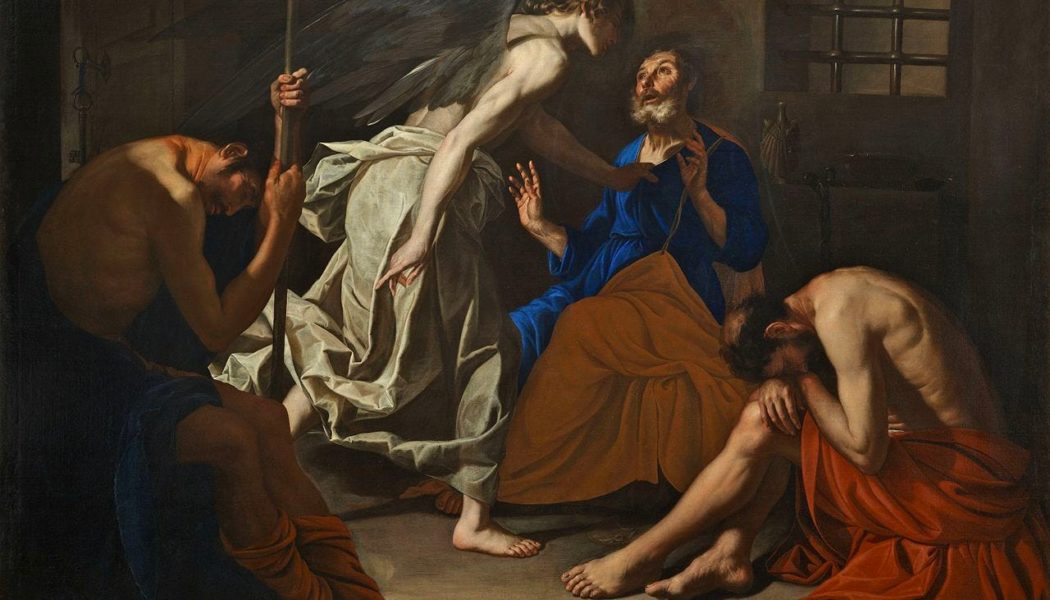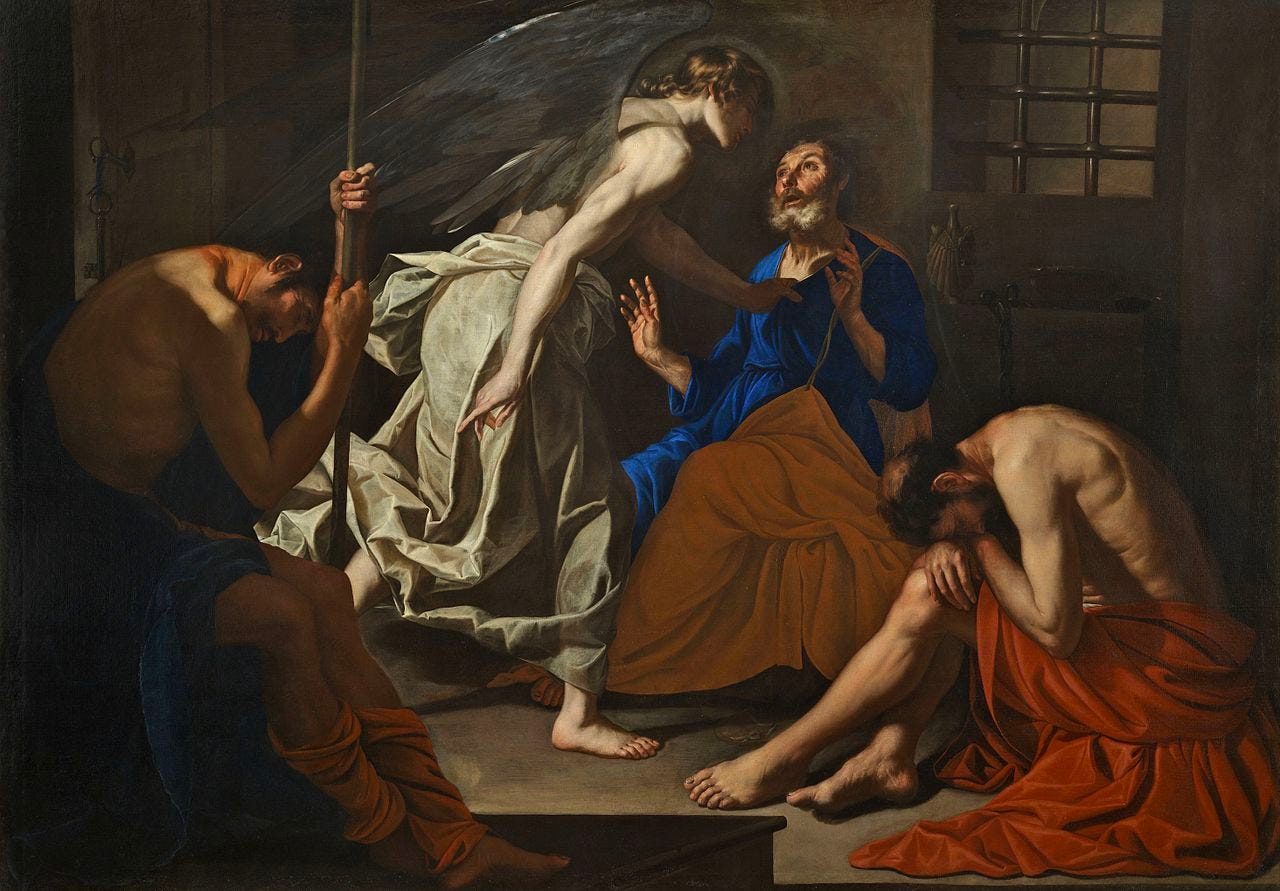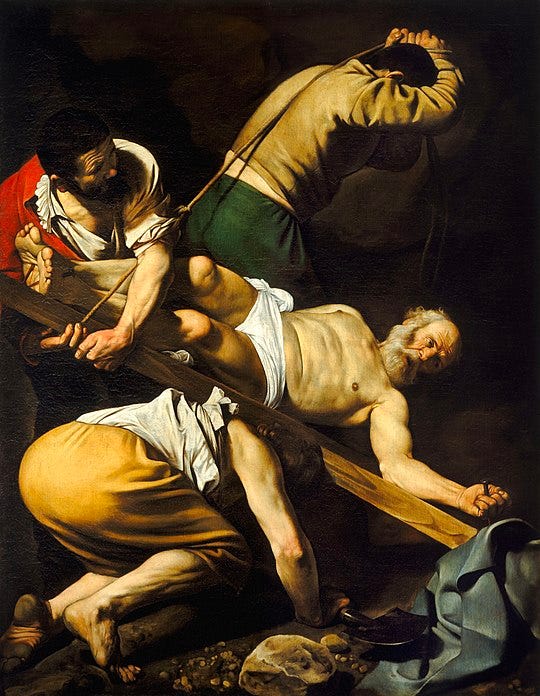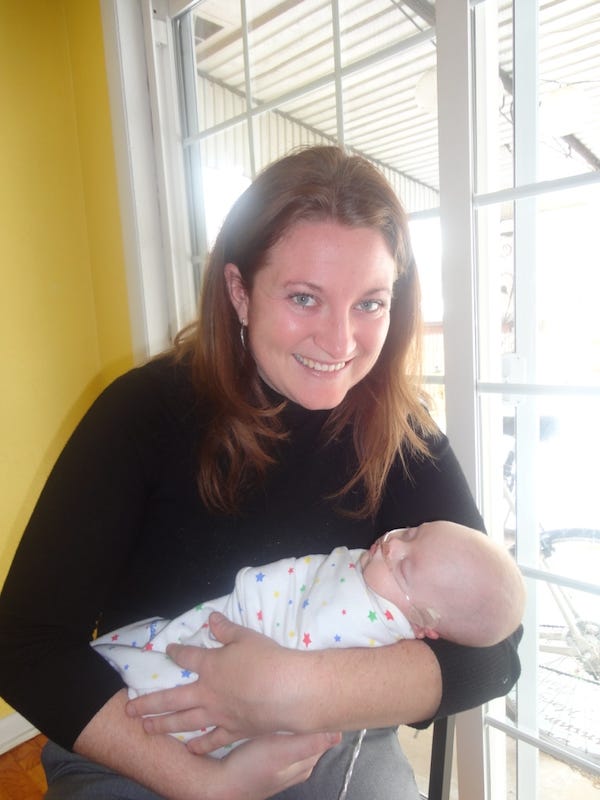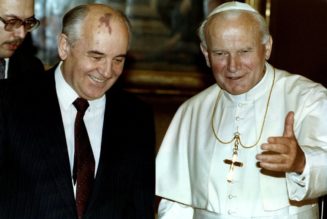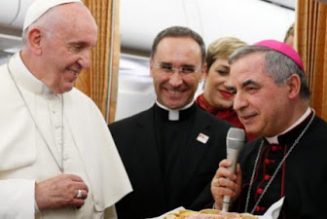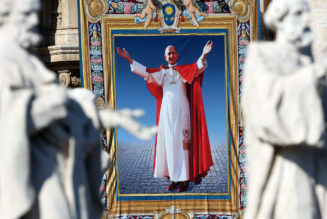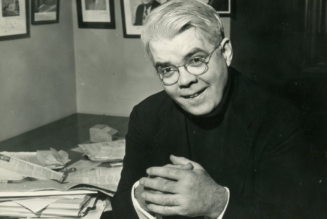Hey everybody,
Today is the feast of St. Peter in Chains, which commemorates St. Peter’s rescue from jail, as recounted in the Book of Acts.
If you don’t know the Biblical story, it’s quite cool.
Peter was arrested in Jerusalem, after being harassed by Herod II.
There were a few Herods operating in the Holy Land in the days of Jesus and the early Church, and they can be hard to keep straight. This Herod was the grandson of the Herod who ordered the slaughter of the innocents at the time of Jesus’ birth. He was not the Herod involved in the death of St. John the Baptist, or that of the Lord himself.
But this Herod is the last of the Herods, and he did have James the Great, one of the apostles, martyred.
Herod II might have had Peter killed too, but God had different plans for him. As Peter slept one night bound in chains, under heavy guard, an angel appeared. Peter actually thought it was a vision, the Scripture said, and not an actual happening at all.
But the chains fell from Peter’s wrists, and the angel told him to get dressed, and then led him past the guards and into the city. Then Peter met with a group of early Christians, and was soon out of the city and off on his way.
It’s an extraordinary account of the Lord’s providence, and his particular plan for Peter, the rock on whom that Church depended.
But it’s worth remembering that God didn’t spare Peter so that he could disappear into a life of comfort, having already done his bit for the Kingdom. Nor did Peter start giving Ted talks and making money, as the guy who was “touched by an angel.”
This wasn’t the end for St. Peter — he was loosed from his chains because the Lord still had work for him to do.
The Lord spared Peter from martyrdom in a Jerusalem prison so that he could continue the work of evangelization for some 20 more years, before his own martyrdom outside of a Roman prison, crucified upside down.
Yeah. God saved Peter from certain death in Jerusalem, so that Peter could face a different certain death, in Rome.
He lived to die another day.
And with the faith of an apostle, Peter rejoiced in that. He wouldn’t have had it in any other way. He wouldn’t have expected anything different.
If we’re living the Christian life, we move, as it were, from grace to grace, from gift to gift, not for our glory, or comfort, but because God knows what he is about, and because he has created each of us for some definite service — and he’s going to make sure we get the chance to do it.
Our lives belong to Providence, not to ourselves. May we have eyes to see it.
The news
Hundreds of thousands of pilgrims have made their way to World Youth Day this week, in Lisbon, Portugal, and we’re aiming to bring you the best Lisbon reporting you’ll read, from our World Youth Day correspondent, Filipe D’Avillez.
Here’s what we got:
— Since World Youth Day Lisbon was announced in 2019, organizers have said they want to make the gathering the greenest edition of World Youth Day yet.
World Youth Day 2023 has cut down on the use of paper, changed the distribution of meals, and posted recycling guidance posters just about everywhere pilgrims are gathering. Further, the World Youth Day app includes a “carbon footprint calculator,” allowing pilgrims to calculate just how much global warming their participation is causing.
A pilgrims’ guidebook also includes tips on offsetting their World Youth Day carbon footprint — including cutting down on the consumption of meat.
But, as you can imagine, these tips aren’t popular with everybody — including a number of Portuguese World Youth Day participants.
So we talked with them.
And here’s the verdict, and the lesson being learned by World Youth Day’s organizers: It’s not easy being green.
[As an aside, I’ve noticed that tree planting is a commonly selected activity at interreligious shindigs. I’m not sure if that’s the result of zealous lobbying from the Arbor Day Foundation or what, but I do find it funny. It’s my observation that if you see a priest or bishop planting a tree, there’s probably going to be an imam, a rabbi, or a mayor hanging about nearby, bearing a ceremonial shovel.]
Sources told The Pillar that there was also some difficulty in getting the local organizers in Portugal on board for a focus on interreligious dialogue during World Youth Day, until apostolic nuncio Archbishop Ivo Scapolo personally intervened to make clear that it was a papal priority.
The siege is the latest chapter in the decades-long conflict between Armenia and Azerbaijan, small nations in the Caucasus Mountains, at the barrier of Europe and Asia.
The suffering might seem far from home, and difficult to understand — and indeed, the geopolitical history is complex.
But the humanitarian crisis is acute — and Bishop Mikaël Mouradian wants to be sure that readers of The Pillar know about it.
Bishop Mouradian, of the Eastern Catholic Armenian Catholic Church, talked with The Pillar about the humanitarian crisis, its roots, and what Americans can do.
He also talked about his unique pastoral experience as one of the first Armenian Catholic priests in Armenia after the fall of the Soviet Union — and those experiences are fascinating.
Like this, for example:
Once, I went to visit the village of Sucwalizi, in southern Georgia. I went there by car, it was a journey of five hours from where I was.
When I arrived at the village, people were waiting for me, on the road, at least one mile outside the village. They had been waiting to see a priest, after 70 years of having no priest in their village.
They had green branches in their hands, and they walked alongside my car while I was driving to the church of their village. They were singing hymns to the Holy Virgin Mary, hymns that they were learned by secret from generation to generation during the Soviet Union.
I had tears in my eyes, because I was thinking, “Who am I that, like Jesus, people are welcoming me with these green branches?”
But they were waiting because it was something special to have a priest finally again in their village. And I am humbled even now by that.
I learned about people who, for so many years, were baptizing their kids in secret at home, because they couldn’t bring a priest in —- and teaching these children the Our Father, to keep the faith alive.
This is the faith of the Armenian people, who are now so threatened today.
Read this important interview here.
The update is this: Pope Francis has appointed Slovakian Catholic Archbishop Cyril Vasil’, SJ, as papal delegate to the archdiocese. This means, directly, that the pope has told Archbishop Vasil’ to sort out the fight — which is so profound that it’s led to vandalism of a sanctuary, the disruption of liturgies, a locked cathedral, and a cardinal burned in effigy.
It won’t be easy. In fact, I can’t see how Archbishop Vasil’ has much path toward success — especially since the men has already dispatched to solve the problem have failed.
But Vasil’, apparently, has got to try. So let’s see what happens next.
Vietnam is a one-party Asian socialist republic which has long had an agreement with the Holy See regarding collaboration on the appointment of bishops.
Does that sound familiar? Well, it should. And as the Holy See’s “Vietnam deal” takes a big step forward, it’s worth asking whether Vietnam was the Vatican’s template in crafting its deal with China — and why the Church’s freedom has played out so differently in those two places.
In an insightful analysis Saturday, Ed Condon asked exactly that. Read it here.
Finally, I don’t usually use this newsletter to point you to The Pillar Podcast, but today I’m going to make an exception.
It was draft day last week at The Pillar Podcast — On Friday Ed and I recorded a very fun episode, as we conducted competing mock drafts for a new C9 Council of Cardinal Advisors.
I think Ed drafted a very good kitchen cabinet, but I think mine was better.
Listen to a great episode, and let us know what you think.
Varia
I mentioned last week that Ed and I are at a canon law conference this week, which means the news might seem a bit slow-going, and this newsletter is a bit short. But rest assured, that doesn’t mean we aren’t working.
Keeping up on the latest in canon law, and keeping up with what canonists are working on, is a critical part of how The Pillar does what we do.
This summer has been, for me, a good deal of travel, both for work and with the family. But I’ve got on my desk a growing pile of important stories to dive into — the kind which require the careful and deliberate application of time, and the kind of deep-dive attention that we get to give at The Pillar, thanks to our subscribers. Keep your eyes peeled for more soon.
—
If you spent too much time online this weekend, you might have seen a brouhaha among Catholics over a post on the 2024 national Eucharistic Congress from a National Catholic Reporter blogger.
The post sparked controversy, over the claim that the speakers booked for the Congress are from the “Steubenville wing of the Church,” and that some of them “talk about Pope Francis like he is a leper or they traffic in the kind of culture war ideology that this pope is so keen to keep at a distance.”
It was not an especially consistent post, criticizing one speaker for making the supposedly facile claim that the papacy is divinely instituted, and criticizing another for failing to sufficiently praise Pope Francis. But it generated a lot of social media posting among Catholics, and some criticism that the announced speakers are insufficiently supportive of the agenda of the pontiff.
I actually haven’t seen that. We’ve called attention to figures who talk about the pope “like he is a leper,” and even suggested canonical penalties they might face for their rhetoric. But I don’t see any evidence, and none was presented, that the speakers on the agenda for this event fit that bill.
Look, The Pillar has covered the Eucharistic Congress critically — we’re not in the bag for them — and we’ll continue to do so as appropriate. And criticism and discussion of the Congress are fair game. Indeed, whether and how the Eucharistic Congress will actually spark revival in the Church’s life is another question, and worth conversation.
But there is emerging a framing in some corners of Catholic commentary that a gathering of Catholics to adore the Eucharist and be catechized is somehow inimical to the pastoral agenda of the pope, or contrary to the Church’s works of mercy and apostolate. Some bishops have suggested that the Eucharistic Congress is meant as a distraction from the synod on synodality, which should take priority.
I don’t think that’s true, and neither does the pope, apparently. I don’t think they’re in opposition at all. In fact, the pope has been quite clear that works without faith, so to speak, are dead — that if the Church is an agent of charity which is not rooted in the Eucharist, it has surrendered its mission and become an NGO.
The Eucharist is the source and summit of the Christian life, or it is not.
If the Eucharistic Congress is, indeed, the source and summit of the Christian life, then it’s extremely reductive to make of the Eucharistic Congress a referendum on the pope, or to suggest that support for the Eucharistic Congress constitutes ignoring the pope. Those who have made the Congress a political event have wrapped themselves in the pope’s mantle, but even a cursory understanding of his theology suggests it’s a false claim.
In short, it doesn’t come as a surprise that the Eucharistic Congress has been refashioned into a political battleground by those who would reduce the Church to power politics. But perhaps that reality should remind us just how much a revival — Eucharistic and otherwise — is sorely needed.
—
Here’s a prayer request:
In New York City on Saturday, several members of the Sisters of Life will profess their final vows, definitively promising to God a life of poverty, chastity, and obedience, in service to the Gospel of Life.
Among those sisters will be Sister Mercy Marie, who has been one of the Flynn family’s closest friends for more than a decade.
In the early years of our marriage, one of our greatest blessings was that a woman named Kate Sweeney was a frequent guest at our dinner table, and a regular fixture in our lives and in our home. We played, sometime in our 20s, on a kickball team with Kate, and we spent a lot of time in prayer and friendship with her.
As we waited for children in the early years of our marriage, praying that God would fulfill the desires of our hearts, Kate accompanied us with love and with hope — and we had the joy of accompanying her as she too, waited for the Lord’s plans. We had a lot of fun hearing in the aftermath about Kate’s dates, and the hilarious situations in which she sometimes found herself.
When we adopted our son Max in late 2011, Kate was the very first friend to come to the hospital and meet him.
And then one day soon after, Kate came to our house and told us she had met someone, and she was ready to commit the rest of her life. Knowing the goofballs she’d met on the dating scene, we held our breath.
But that someone, she said, was the Sisters of Life, and, especially, that she had met Christ more concretely among them.
She entered the community soon after, and she became Sister Mercy. We’ve been blessed to see our friend grow in religious life, and, in doing so, grow into herself more beautifully.
Like St. Peter, and like the rest of us, God has, I’m sure, some very particular plan in mind for Sister Mercy, and is calling her to some very particular martyrdom. I suspect her profession of vows will be an important step on that journey.
I ask your prayers for Sister Mercy, and for the sisters with whom she will profess her final vows. May God bless them.
Please be assured of our prayers, and please pray for us. We need it.
May we all live to die another day, in and for the Lord.
Yours in Christ,
JD Flynn
editor-in-chief
The Pillar
Editor’s note: This newsletter initially identified Archbishop Cyril Vasil’, SJ, as a Slovenian. He is in fact Slovakian. The text has been corrected.
Comments 15
Services Marketplace – Listings, Bookings & Reviews
